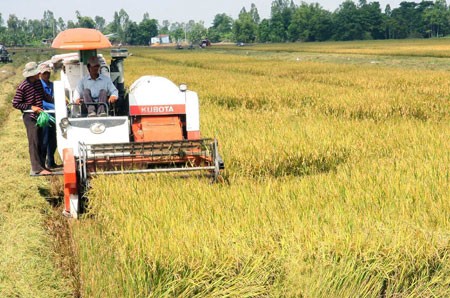(VOVworld) – The Mekong River Delta is the country’s largest granary with 3 crops per year cultivated in 1.8 million hectares of land. Over the past decade, though the area has made remarkable progress in mechanized rice production, it has yet to develop completely and also meet national demand. Agricultural mechanization is key to success. Bích Huyền, VOV reporter in Ho Chi Minh City reports.

Machines help farmers in An Giang's Phu Thuan Commune harvest crops, addressing the labor shortage and reducing post-harvest losses (Photo: Dinh Hue/VNA)
|
The application of mechanization to rice production has helped the Mekong River Delta increase the region’s productivity to 5.7 tons per hectare this year from 4.3 tons per hectare in 2001 and the output to 24.5 tons from 16 tons. Machines are used in many phases of the production process, particularly in harvesting, cutting half of the costs.
Long An province, a leader in mechanizing rice harvest in the region has been engaged in outlining many policies to encourage the process thus raising labor productivity, reducing production costs, and improving local people’s living standards. Nguyễn Thanh Tùng, the Director of Long An’s Center for agricultural development, says “we are applying a laser machine to level the surface of rice fields which is believed to create a breakthrough for farmers to better control rice variety, fertilizers and cultivation process. When rice fields are restructured for mechanization, ploughing machines will be used to ensure reduction of labor costs. But to boost the mechanization process, it’s necessary to support farmers financially. At the same time agricultural machinery manufacturers should conduct more research and provide the market with machinery adapted to the needs of farmers, especially those in the Mekong River Delta”.
Võ Văn Chất, a farmer of Tân Thạnh district, Long An province, has grown rice varieties for the agriculture development of the provincial center for a decade with an average productivity of 8 tons per hectare. Since 2003 when he and seven other households began to use combine-harvesters and rice dryers, the harvest time has been shortened by 20 days compared to manual work. Losses during the harvest process have been reduced from 30% to 10%. Chất says each of his group has earned an additional 700 USD per hectare adding “the mechanization is convenient for farmers but it’s still new to us. We hope the government will support us to get bank loans to buy the more efficient equipment”.
Although the Mekong River Delta has prioritized investment in the mechanization of agricultural production, the process remains modest specifically in soil tending, watering, harvest, and drying.
Statistics show that soil tending for rice cultivation has a high mechanization rate of 90%. Only about 50% of rice fields in the delta are now using machines to harvest the crop, and the rate of mechanization in drying rice was even lower at around 33% for crops, causing huge harvesting and post-harvest losses.
Doctor Lê Văn Bảnh, director of the Mekong Delta Rice Research Institute, also recognizes the urgent need for using machines. He says “transplanting rice seedlings is the most important phase of the rice farming. With the current shortages of rural labor, the use of tractors can transplant up to 5 hectares a day. But to be able to implement machines, it’s necessary to better conduct zoning plans, establish large-scale farms. At the same time, farmers are still worried about the high investment costs for tractors thus requiring more communications and advertisements. The machines will be used more widely if they are manufactured by Vietnamese companies”.
What farmers now need is state support of low interest rate loans and instructions for the use of technology. The chief of the representative office of the National Center for Agricultural Development in Ho Chi Minh City notes “the use of machinery in sowing seeds and transplanting will create a breakthrough in productivity. Once this can be realized, Mekong River Delta provinces can increase the output of Winter-Spring crops to 10 tons from the current rate of 8 tons and 7 tons for Summer-Autumn crops”.
Mai Thành Phụng furthers the efficiency of mechanization in rice cultivation can be done if there are appropriate policies set up in line with the cooperation of agricultural officials, scientists, businesses, and farmers.
Bich Huyen